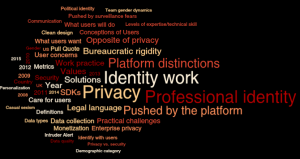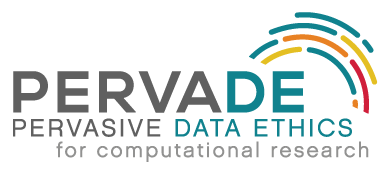Data Ethics Regulators
Historically, the bulk of research ethics practices and regulations have been mediated through university-based IRBs. However, much pervasive computing research falls outside of formal university-based ethics infrastructures. This series of sub-projects assesses and compares how ethics regulators respond to this disjunction.
IRBs and Pervasive Data
Lead: Jessica Vitak with Katie Shilton & Jacob Metcalf
This subproject investigates the attitudes and practices of the professional staff of institutional review boards (IRBs)—the organizations that review and monitor human subjects research at U.S. universities—to understand their assessment of pervasive data  research. Commissioned to ensure that individuals participating in research are protected from harm, IRBs have struggled to define where and when social computing research methods fall under their jurisdiction. At the same time, researchers must be aware of what IRBs are doing—and what can be done better—as part of the larger effort to ensure individuals represented in the data are properly protected.
research. Commissioned to ensure that individuals participating in research are protected from harm, IRBs have struggled to define where and when social computing research methods fall under their jurisdiction. At the same time, researchers must be aware of what IRBs are doing—and what can be done better—as part of the larger effort to ensure individuals represented in the data are properly protected.
We use interviews, focus groups, and surveys to ask: 1) How confident are IRBs of their ability to regulate research involving pervasive data? 2) How are IRBs adjusting their work to accommodate studies involving pervasive data? 3) What gaps and needs do IRB staff anticipate to effectively regulate pervasive data research? Building on the empirical data about the needs of IRBs, alongside empirical data about the actual risks of inferences drawn from publicly-available datasets, we will build a web-based decision tool to help researchers, regulators, and policymakers predict and ameliorate the risks associated with pervasive research datasets.
Data Ethics in Corporate Environments
Lead: Jacob Metcalf with Katie Shilton
Pervasive data companies such as Microsoft, Facebook, and Fitbit are beginning to document their internal efforts to provide IRB-like review processes. Others such as Google Deep Mind, Planet Labs, and Palantir have favored external committees for ethics advice. Major consulting firms such as Accenture and Avanade have also indicated their interest in offering data ethics as a service. This project engages in a discourse analysis of corporate internal ethics review processes, soliciting internal documents as available from our advisory board members, public-facing documents shared by these companies, and interviews with corporate ethics actors.
By analyzing discourse in each, it will answer questions such as: 1) In what ways have corporations adopted the values and interpretations of the Belmont Report and the Common Rule? 2) In what ways are corporations innovating on traditional review processes that may be informative for university-based IRBs?
